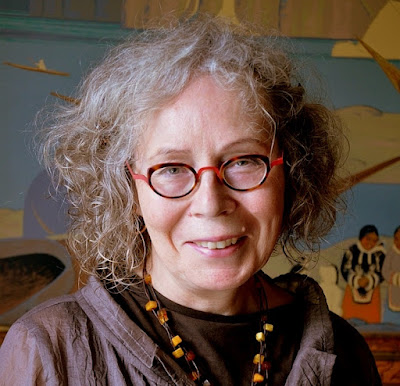Eva Stachniak
Eva Stachniak is an award-winning and internationally bestselling author of six novels, including The Winter Palace, Empress of the Night, and The Chosen Maiden.
Stachniak's new novel is The School of Mirrors.
My Q&A with the author:
How much work does your title do to take readers into the story?Visit Eva Stachniak's website.
For a long time, I called the novel Deer Park after the mysterious house in the town of Versailles where Louis XV’s courtiers groomed young, lower-class girls for the king’s sexual pleasure. But as the novel grew and expanded in scope, the title became too restrictive. The School of Mirrors opened it up. It played on the theme of deceit and illusion in the corridors of Versailles, but also the deceptive fantasies that ruled the streets of Paris during the heady years of the French Revolution. Mirrors reflect, entice, but they can also force us to confront what we do not want to see.
What's in a name?
There are two heroines in the novel, mother and daughter, separated at birth and searching for each other all their lives. The mother’s name is Veronique, which means “true image” in Greek and throughout the novel Veronique is clinging to her true nature, despite the betrayals she faces. Her daughter’s name is Marie-Louise, the name bestowed on her by the king’s servants for whom pregnant Veronique is just a chore and a nuisance. The name may seem ordinary enough, but it echoes two names significant in the novel. Marie links the baby girl to Marie Leszczyńska, the powerless queen of France, and to Louis XV himself, the powerful king who is the girl’s unacknowledged father. This tug of war between power and powerlessness is the essence of Marie-Louise’s life.
Do you find it harder to write beginnings or endings? Which do you change more?
Endings are harder because they can only truly be written when the whole book is finished. I write to discover the story I am working on. To do it I often change focus, placement of scenes, their significance. Only when I have the basic shape of the novel, I can come up with the proper ending. Beginnings are much easier. For me novels begin with a voice that tempts me into the story. The School of Mirrors began with a woman’s voice: “My mother didn’t tell me much. I would have to go into service, she said…” The rest I had to discover on my own.
Do you see much of yourself in your characters? Do they have any connection to your personality, or are they a world apart?
In some, yes. Marie-Louise is much closer to me than Veronique. I understand her anger at being abandoned, her loneliness, her long and troubled search for hermother. I gave her a lot of my own experience of being a daughter, of relating to her mother through silence and confusion.
What non-literary inspirations have influenced your writing?
The revelations of the #metoo movement, the persistent reminders that sexual exploitation is still rampant. The sordid stories of Jeffrey Epstein and his enablers which made the Deer Park story so relevant.
These parallels to the present intensified when I turned my eye to revolutionary France. It was impossible to ignore how much the agitation, the political screaming, the confusion in contemporary media mirrored the agitation of the streets of Paris during the French Revolution. How the revelations of police reports, the libels resembled the tabloids of our times. And these expressions we shared: The enemies of the people… Revolution devours its children… Revolutions are not made with rosewater.
The more it changes, as the French saying goes, the more things remain the same...
The Page 69 Test: The Chosen Maiden.
--Marshal Zeringue
